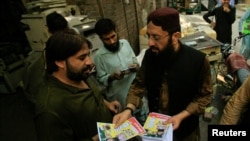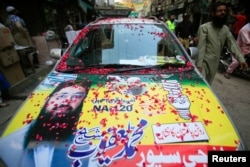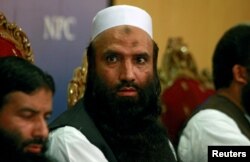A federal court in Pakistan has sided with a new political party whose bid to register with the national election commission was rejected because of the party's ties to an Islamic cleric designated as a global terrorist by the United Nations and United States.
In its ruling Thursday, the Islamabad High Court directed the commission to review the earlier decision against the Milli Muslim League. The MML is said to be a political wing of cleric Hafiz Saeed's Jamaat-ud-Dawa (JuD) charity. Authorities have accused the cleric of masterminding the 2008 Mumbai terrorist attacks that killed 166 people, including Americans.
U.N. and U.S. officials say JuD is a front organization for Lashkar-e-Taiba (LeT), the group blamed for carrying out the carnage in the Indian financial capital.
Washington has placed a $10 million bounty on Saeed, who is also the LeT founder, for allegedly masterminding the attack. The cleric denies the charges and links to LeT, saying Indian and U.S. pressure is forcing Pakistan to restrict his charity work.
The MML was established in August 2017 in a bid to find a place for JuD in Pakistan's political mainstream, sparking criticism of the government's counterextremism efforts.In October, the election commission rejected the MML's registration application, which is required for all political parties that want to take part in parliamentary elections.
Interior Ministry's input
The commission based its decision on written advice from the Interior Ministry, which said the party was linked to charities under domestic and international anti-terrorism sanctions. In response, the MML appealed to the high court.
The party's candidates have since run as independents in several by-elections, using photographs and banners featuring Saeed. The candidates could not win, but secured more votes than several mainstream political groups.
Thursday's court ruling came days after the global watchdog group Financial Action Task Force (FATF) said Pakistan was not doing enough to crack down on terrorist financing. The FATF, which monitors such activity and money laundering, said Pakistan would be placed on the group's terror watch list, known as the "gray list."
The decision followed a recent FATF meeting in Paris in which the United States, France, Britain and Germany introduced a resolution alleging that Pakistan had failed to adhere to the FATF guidelines to curb terror-related financial crimes.
In the run-up to the meeting, Pakistani authorities amended laws to blacklist individuals and groups such as JuD and its sister organization, Falah-e-Insaniat Foundation (FIF), which is also a U.N.-designated terrorist organization. Those actions, however, failed to convince member nations.
Terror financing remains a major concern and challenge in Pakistan, where militant groups allegedly raise money under the guise of religion and welfare for the poor and spend it on terror-related activities there as well as in India and Afghanistan.
Financial risks
The FATF designation takes effect in June and could pose serious economic risks for Pakistan in terms of attracting foreign investment and dealing with foreign banks. Officials have downplayed those fears, and say Pakistan's placement on the gray list in 2012 did not prevent economic growth and investment.
Pakistani officials maintain they will be able to address international concerns to get the country removed from the latest gray list. Saeed is still moving about freely and delivering anti-India and anti-U.S. sermons in Lahore mosques. On Wednesday, a court in the eastern city prevented authorities from arresting him, citing lack of evidence.













